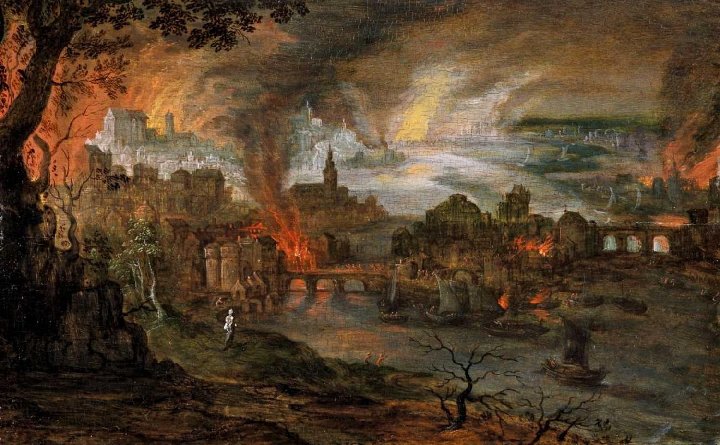When responding to, “What about the unquenchable fire in Mark 9:48?” we need to realize that Jesus is quoting verbatim Isaiah 66:24 in this passage so please read, Why rarely cited Isaiah 66:24 is a key for a more complete understanding of this scripture. Proper hermeneutics demands that we interpret scripture with scripture…including Mark 9:48. If Jesus is quoting Isaiah, shouldn’t we read Isaiah too? Obviously Jesus would not disagree with Isaiah. Was Isaiah talking about the soul? Clearly he was not.
Second of all, if God throws something into eternal fire, who says that what is thrown in, is eternal also? Inter-Varsity Press author John R. Stott rightly concludes:
“…it would seem strange…if people who are said to suffer destruction are in fact not destroyed…it is difficult to imagine a perpetually inconclusive process of perishing.”
(J. Stott and D. Edwards, Essentials: A Liberal-Evangelical Dialogue, London: Hodder & Stoughton, 1988, p. 316)
Third of all, this phrase in Mark 9:48 is used elsewhere in “Tenach” (the Old Testament) and is never used to mean eternal torment. If you look up Isaiah 66:24, Jeremiah 7:20 and 17:27, and Ezekiel 20:47-48, they all mention that same phrase. And reading the context of these verses, it can clearly be seen that “unquenchable” means a judgment that man cannot “quench” or “talk God out of.” In other words, no one can talk God out of it and it will indeed run its course. Has God ever been “talked out of” something in the past? Yes. Clearly Moses talked God out of destroying Israel in the desert. (Exodus 32:10-14) In a real sense–Moses “quenched” God’s anger against Israel.
Fourth of all, remember it (the fire) was “prepared for the devil and his angels.” (Matt 25:41) It was never, never made for humans. Humans will perish in the fire, not be preserved in the fire. With that in mind, reread the second point above by John Stott.

Richard G
Stott is clear on his position, I read that C. Pinnock and Michael Green also take the same view. Which other Evangelical theologians are at least sympathetic to this viewpoint?
Dirk Waren
Here are several current ministers off the top of my head: David Reagan of Lamb & Lion Ministries, David Kirkwood of Heaven’s Family, Paul Ellis of Escape to Reality (although I strongly disagree with his “radical grace” perspective, which is cleared-up here), Jay Altieri, our in-house Douglas Barry (which is a pseudonym since he ministers 70 times a year in assemblies, many of which embrace the eternal torture doctrine) and me & my ministry, Fountain of Life.
In addition, here are myriad notables from Church History:
Leo X, Pietro Pomponatius, Martin Luther, Francis Blackburne, William Tyndale, John Frith, George Wishart, Johann von Mosheim, Joseph Priestley, Richard/Robert Overton, Samuel Richardson, John Milton, George Wither, John Jackson, John Canne, John Tillotson, Isaac Barrow, William Coward, Henry Layton, Joseph Nicol Scott, Joseph Priestley, Edmund Law, Peter Pecard, Francis Blackburne, William Warburton, Samuel Burn, William Whiston, John Tottie, Henry Dodwell, Timothy Kendrick, Amos Phelps, William Thomson, Edward White, John Thomas, H.H. Dobney, Richard Whately, Dean Henry Alford, James Panton Ham, Charles F. Hudson, Robert W. Dale, Frederick W. Farrar, Herman Olshausen, Henry Constable, William E. Gladstone, Joseph Parker, John J. S. Perowne, George G. Stokes, W.A. Brown, J. Agar Beet, R. F. Weymouth, Lyman Abbott, Edward Beecher, Emmanuel Pétavel-Olliff, Franz Delitzsch, Charles J. Ellicott, George Dana Boardman, J.H. Pettingell, Canon William H.M. Hay Aitken, Eric Lewis, William Temple, Gerardus van der Leeuw, Aubrey R. Vine, Martin J. Heinecken, David R. Davies, Basil F.C. Atkinson, Emil Brunner, Reinhold Niebuhr, T.A. Kantonen, D. R. G. Owen, E.W. Bullinger, Oscar Cullmann (1902-1999), Helmut Thielicke (1908-1986), F. F. Bruce (1910-1990) and John William Wenham (1913-1996)
I realize that not all of these are technically “Evangelicals,” but they certainly all believed in evangelizing the lost.